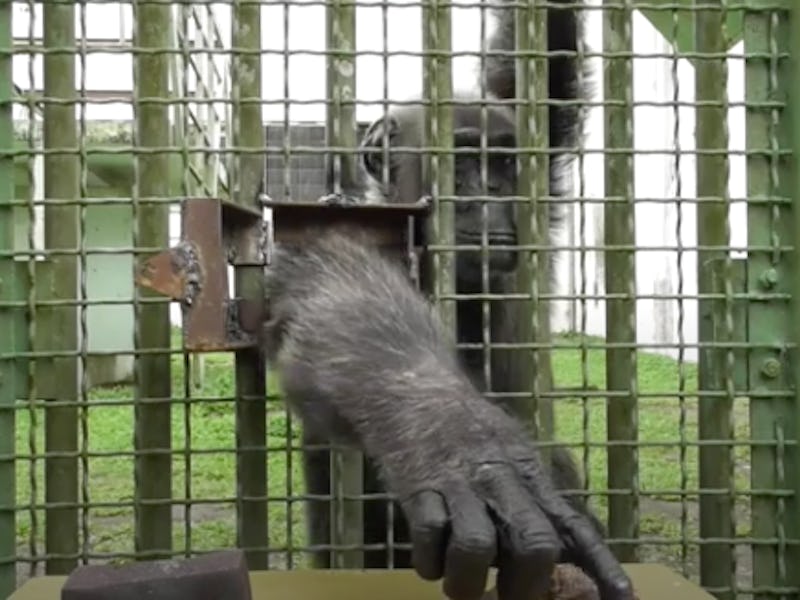Weird Chimp Experiments Reveal Their Bizarre Poop Eating Etiquette
It turns out chimpanzees might get disgusted too.

Chimpanzees famously fling their own poop and have no problem picking seeds out of it, but scientists say our primate cousins may be a bit more hesitant about touching feces that isn’t their own. It may sound kind of obvious that they would be grossed out by a stranger’s poop, but disgust of another chimp’s biological goods hadn’t been observed in these animals before.
Building on existing research about the roots of human disgust, which scientists say is rooted in our natural tendency to avoid disease vectors, new research published Friday in Royal Society Open Science suggests that disgust may not just be the purview of humans.
In the paper, an international team of scientists presents the first evidence that chimpanzees also tend to avoid biological contamination when feeding. In a series of experiments, they found that chimps were hesitant to grab food off of fake feces and were downright unwilling to grab food off of an unseen wet blob.
This behavior is consistent with what we know about disgust in humans, which is thought to have evolved to help us avoid catching diseases from eating strange food contaminated with someone’s blood, semen, vomit, feces, or any other bodily excretion. In the experiments, Cecile Sarabian and Andrew MacIntosh of Kyoto University in Japan collaborated with Barthelemy Ngoubangoye of the Primate Center at the Centre International de Recherches Médicales de Franceville (CIRMF) in Gabon, setting up experiments to test whether chimps would eat food that could be contaminated. In one such experiment, they put a banana on top of a piece of fake poop and watched to see if the chimps would take it.
In this video, you can see that an adult male chimp named Vaillant ate both the poo-mounted banana and the control piece that was placed on a brown foam block, but he was a lot more careful to avoid touching the fake poo. He wasn’t alone, either. Most of the chimps presented with the visual contamination cue of fake feces ate the banana, but they almost always grabbed the banana off the fake poo after taking the piece from the control foam.
“These results might suggest a preference for food that is not associated with contamination risk, although it does not suggest avoidance of such risk altogether,” write the study’s authors.
In another experiment, though, chimps expressed a much clearer tendency to avoid biological contamination risk. They reached inside a box to forage for pieces of banana, which were either resting on top of a piece of rope (the control condition) or wet dough (the experimental condition).
In this scenario, the chimps reacted in much the same way that a human might — by pulling back their hand. While it’s not clear whether the chimpanzees are experiencing what we could call “disgust,” they did consistently avoid the food sitting on the dough. These results suggest a strong similarity with humans, as the study’s authors write that similar dough “has been used in human experiments to replicate the consistency, temperature and moisture of a potentially contaminated substrate.”
The researchers also conducted an experiment to test how odor plays into chimps’ disgust responses. In this experiment, the area around a food sample was “painted” with blood, semen, feces, or water. They found only a minor decrease in the number of chimps who chose to eat the food when there was a biological contaminant that they could smell but not see when compared to water.
“Taken together, our results suggest that the adaptive system of disgust might play a role in mediating feeding decisions of chimpanzees, and that these primates incorporate multiple sensory modalities in so doing, although it does not preclude their engaging in potentially risky foraging behaviours from the perspective of pathogen acquisition,” write the study’s authors.
The results in two out of three of these experiments, admittedly, are not very strong. But in the touch-mediated disgust experiment, the apes behaved very similarly to the way humans might react to touching something soft and wet in a dark box. And for this reason, it’s worth further investigating how our great ape cousins might experience the world in a startlingly similar way when compared to humans.
These chimps murdered and ate their tyrant leader.